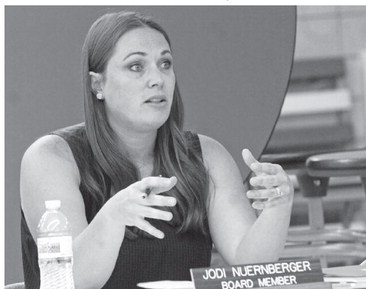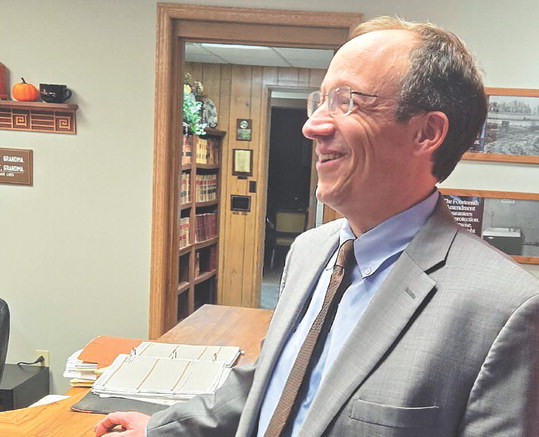Seeking solutions


Medford schools hears parent concerns about bullying behaviors
NEWS EDITOR
A small but passionate group of parents and community members attended Tuesday night’s Medford School District policy meeting to review the district’s bullying policy.
This was the second of three scheduled two-hour-long meetings to review the policy. According to policy committee chairperson Jodi Nuernberger, the goal of the process is to have a collaborative approach to look at bullying in the district. She noted that the first meeting focused on the policy and defining what bullying was. “We didn’t want the definition to go too far,” she said, noting not every conflict is bullying. The intended focus on Tuesday’s meeting was to look at the procedures staff should follow when dealing with bullying behaviors.
As with the earlier meeting, Nuernberger invited comment from community members in attendance.
Dwayne Parkinson questioned the intent of the policy and if it represents a contract with parents or if it is a guide- line for staff to follow.
“From my perspective, it certainly isn’t a contract with parents, there are no teeth in this whatsoever,” Parkinson said. “If the policies aren’t carried out, nobody gets fired.”
“The policy is useless to me, absolutely useless,” he said, noting he wants results and wants it to include what happens when policies aren’t followed.
District administrator Pat Sullivan said he viewed the policies as guidelines for employees to work within. “If an employee isn’t following policy then I am involved. They may not be fired right away,” he said, but if there were two or three situations he said he would be going to the board to non-renew a contract.
Parkinson said that he feels the bullying policy wasn’t being enforced, and wasn’t being followed.
He noted that the current policy has nothing to do with the person who got bullied and does not include anything about how they are going to correct the bullying. He noted the bullying is done in public and the child being bullied is brought down in the social structure of the school due to being bullied, but any consequences to the person doing the bullying are done in private. “It leads to the victim in air quotes, to have the narrative of the situation determined entirely by the bully,” Parkinson said.
“What are you suggesting? Punishing in public?” asked committee member Corey Dassow.
Parkinson said that the district needs to build up the student that was bullied. “Everybody saw them get punched, thrown down and kicked. Everyone saw that,” Parkinson said.
“In boys, shame is everything,” he said, adding that by being bullied they have been shamed in public. “Now we have someone who has been shamed. What is our policy for building that person up and addressing it?” he asked.
Nuernberger said there could be opportunities for social skills instruction, counseling options and interventions.
Parkinson went on to explain that after Sandy Hook, the federal government tasked the U.S. Secret Service with doing a threat analysis and develop a way to make safer schools. He described it as developing a tactical mitigation plan.
He said he strongly recommended the school district get a copy of that plan and implement it as an overlay to the school district’s policies.
Parkinson said there needs to be a focus on what decency is with time taken throughout the school day to emphasize what behaviors are acceptable and what are not.
Other parents in attendance raised questions about the policy defining bullying as repeated behavior. Nuernberger also noted that repeated doesn’t necessarily mean it looks the same each time, or even that it is the same aggressor or group of aggressors or that it occurred in the same environment.
This led into a discussion of students who have individualized instruction plans (IEPs) or other special needs who are displaying bullying behavior. Parents questioned how many times it has to occur before one of the students is removed to eliminate bullying from occurring.
Elementary principal Dan Miller explained that when it comes to a child with an IEP or other special needs, if the behavior is a manifestation of their specific disability they cannot be expelled for that reason, but they are still subject to progressive discipline including suspensions for their actions.
One of the frustrations expressed by parents was that they know what impact bullying had on their children but never know what was done to the child doing the bullying.
“That piece is always frustrating,” Sullivan said. He said the district can’t tell people what punishments were given to other students because of student privacy. “We can’t share that with you,” Sullivan said.
Parkinson suggested that if the district had what the consequences of bullying were in the policy they could tell parents that the person was going through that part of the policy.
“When policy has a lot of wiggle room and room for a lot of random decisions we don’t know what is going on,” he said.
Complaints were also made by those present about how complaints against the staff would be handled for when parents did not feel things were handled correctly. Nuernberger explained that under the existing plan, complaints would eventually come to the school board and to the Department of Public Instruction. She said either party may go to the board of education with their concerns.
Board president Dave Fleegel said that in the time he has been on the board this has not happened, but he said he would suggest that if an individual felt strongly they should write a letter to the board with their concerns and asking for it to be reviewed.
“I think it is time for that to happen,” Parkinson said.
Parkinson said there needs to be a focus on teaching what is decent and expected and that it needs to be done every hour of every school day. He gave the example of being in a meeting at Christchurch, New Zealand since the devastating earthquakes there. He said at the beginning of every meeting they spent 30 seconds pointing out the evacuation routes so that no one will get trapped there. He said there needs to be that sort of focus on promoting decency saying that bullying is on the spectrum from decent behavior to indecent.
“How do we make it part of the everyday vernacular?” he asked.
Miller noted the district has had signifi cant success with its Positive Behavioral Interventions and Supports (PBIS) framework which has been in place since 2013. As part of this, data is tracked using office referral forms which record a variety of behaviors. However it also includes positive reinforcement of behaviors and remediation steps.
The district has dropped the number of office referrals in half and is currently at about the 25th percentile among national averages for referrals among schools using PBIS. They noted that the target is to be at about 50%.
“I honestly can’t stand this,” Parkinson said in response to the information about the PBIS program, noting that both of his children have been punched while at school and that he does not think enough was done. “I have lost all faith in your ability,” he said.
“This didn’t work for me, this didn’t work for my kids,” Parkinson said.
Nuernberger attempted to bring the meeting back to discussing the procedure of dealing with complaints.
“If it is such a good policy, why is my kid getting punched,” Parkinson asked. He said that he believes there is a way to 100% get rid of bullying and that he absolutely thinks it can be done.
Nuernberger said that was why they were trying to have the discussion.
Parkinson interrupted saying he did not see the district getting off dead center with it.
Nuernberger noted that they were in the fourth hour of meetings devoted to finding a solution. “We believe we can make a difference and that we can make improvements,” she said, noting that everyone in the room was passionate about wanting to make improvements.
The two-hour time limit for the meeting passed with not much headway having been made on the procedure portion of the policy and suggestions from parents to adopt the more simplified model policy shared from the DPI. It was noted that the Medford policy combines both harassment and bullying. A harassment policy is required by state law and Nuernberger suggested they could look at separating those two.
A third session to address the bullying policy is scheduled to take place on July 20 at 6 p.m.

School board member Jodi Nuernberger responds to a comment from a parent about the process they are going through to review and update the Medford School District’s bullying policy.BRIAN WILSON/THE STAR NEWS




